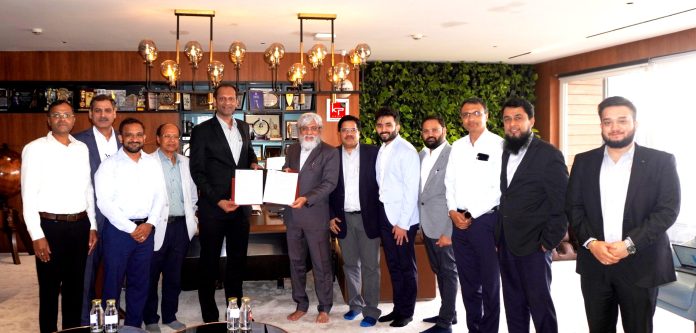Delta Electronics India, a leading provider of power management and smart green solutions, has signed three Memorandums of Understanding (MOU) with KP Group, a prominent renewable energy conglomerate based in Surat. Under the agreements, Delta plans to provide its high-efficiency solar PV inverters, battery energy storage systems (BESS), green hydrogen energy systems, and EV charging infrastructure to KP Group’s projects across India and abroad, including approximately 1 GW of next-generation grid-connected solar PV inverters over the next 12 months.
Speaking on the occasion, Mr. Niranjan Nayak, MD of Delta Electronics India, said, “Delta Electronics India and KP Group already share a long-standing relationship. This new collaboration is a step further and a strong testament to the trust and shared values between Delta and KP Group, such as sustainability, innovation, and reliability. With this 1 GW PV inverter partnership and extended collaboration on BESS and green hydrogen, we are committed to delivering best-in-class technology and lifecycle support to support India’s decarbonization journey.”
Mr. Farukh Patel, Chairman and Managing Director of KP Group, said, “We are proud to partner with Delta Electronics India, a company that exemplifies innovation, reliability, and vision in clean technology. Our partnership is not just about products—it’s about co-creating solutions that empower India’s energy independence. Whether it is solar, storage, or hydrogen, we believe our combined strengths can build a cleaner, more sustainable tomorrow.”
Delta’s advanced solar PV inverters will feature high efficiency, cutting-edge grid support functionalities (e.g., voltage/frequency ride-through, reactive power support, low harmonic distortion), integrated smart monitoring, and remote diagnostics. They will also be future-ready, with hybrid compatibility for solar and storage integration. Delta will ensure strong after-sales support through preventive maintenance, rapid troubleshooting, spare parts support, and technical training tailored for KP Group’s operational teams. The two companies will also conduct regular joint technology workshops to ensure alignment with Delta’s latest innovations.
In view of India’s growing need for energy storage to support renewable integration and ensure grid stability, the BESS MOU outlines a detailed framework for developing and deploying scalable BESS projects. Delta will supply BESS systems, PV inverters, and energy management systems, along with design, integration, and commissioning support. Delta Will provide for advanced grid support features, as well as integrated smart monitoring and remote diagnostics for proactive maintenance.
KP Group will spearhead project development by leveraging its engineering, procurement, and construction (EPC) capabilities. Together, they will jointly deliver energy storage projects in India and potentially overseas markets. Delta will also offer post-installation services, including maintenance training, remote monitoring, and long-term operational support.
In a forward-looking step toward clean mobility, the third MOU focuses on integrated green hydrogen refueling and EV charging infrastructure. KP Group will lead the development of green hydrogen production plants powered by renewable energy. Delta will contribute critical technology including energy management systems, hydrogen compression and dispensing components, as well as EV charging hardware and software, such as power management, compression, and dispensing technologies), and integrated energy management systems. The two companies will jointly design and implement green hydrogen stations and EV charging hubs across India. Delta shall supply EV chargers, including AC and DC fast chargers, energy management systems, and software platforms for real time monitoring and billing. Additionally, the collaboration will focus on skills, with Delta also training KP Group’s teams for safe and efficient station operations.
Delta brings global experience in high-efficiency power electronics, hydrogen-ready infrastructure, and intelligent controls, while KP Group contributes a strong portfolio of land banks, clean energy infrastructure, and local execution expertise. Together, they aim to develop pilot hydrogen ecosystems that will serve industrial decarbonization, fuel substitution, and sustainable transportation.
All three collaborations are structured as long-term, non-exclusive agreements that allow both companies to maintain operational flexibility while jointly advancing key projects, allowing scope for innovation and customization.








